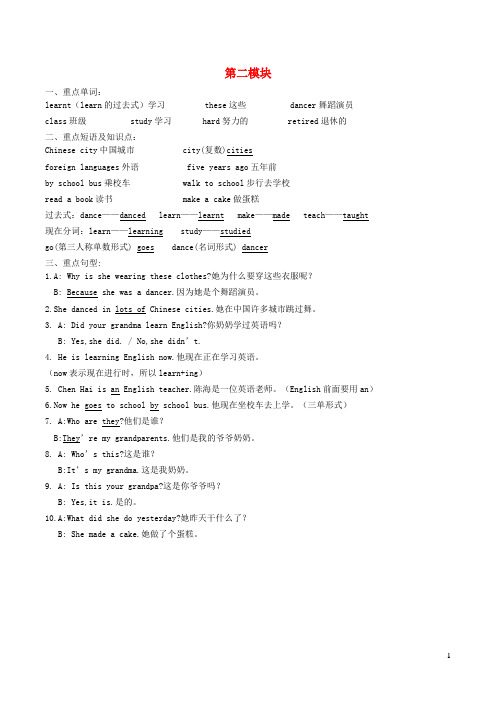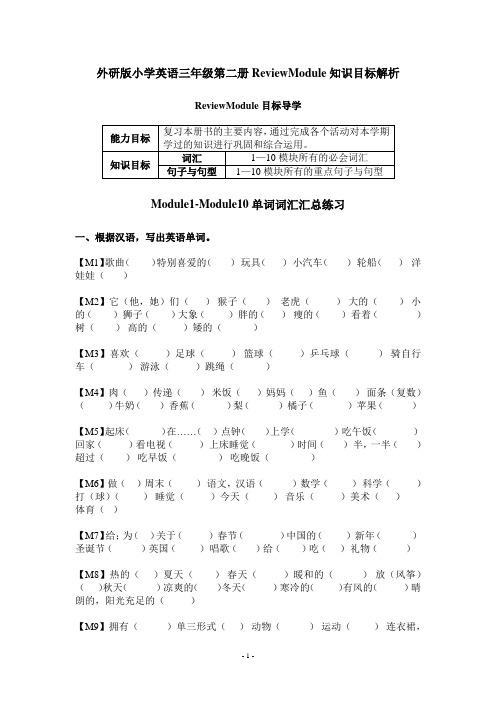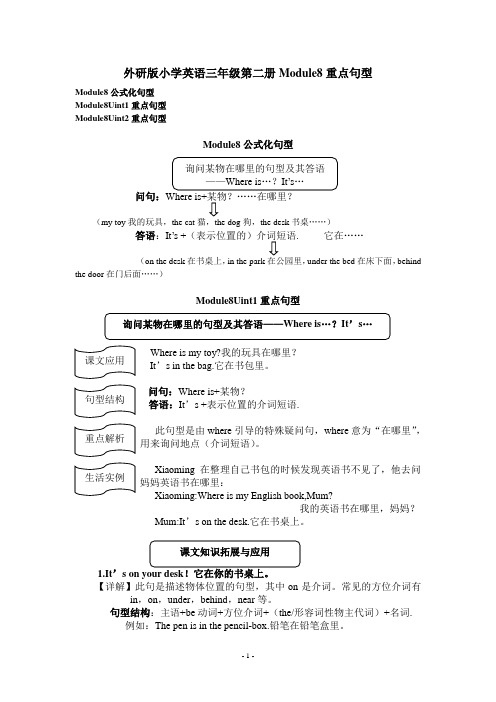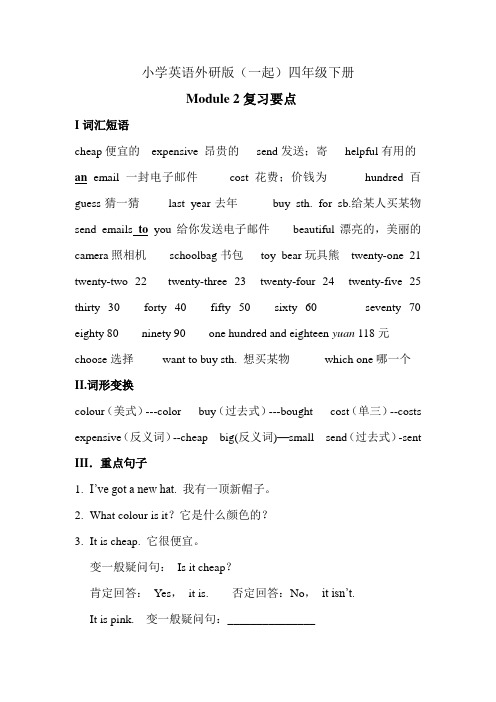外研版小学英语复习的重点词汇和句型
察哈尔右翼前旗第二小学五年级英语下册Module2模块知识梳理外研版三起

第二模块一、重点单词:learnt(learn的过去式)学习 these这些 dancer舞蹈演员class班级 study学习 hard努力的 retired退休的二、重点短语及知识点:Chinese city中国城市 city(复数)citiesforeign languages外语 five years ago五年前by school bus乘校车 walk to school步行去学校read a book读书 make a cake做蛋糕过去式:dance——danced learn——learnt make——made teach——taught 现在分词:learn——learning study——studiedgo(第三人称单数形式) goes dance(名词形式) dancer三、重点句型:1.A: Why is she wearing these clothes?她为什么要穿这些衣服呢?B: Because she was a dancer.因为她是个舞蹈演员。
2.She danced in lots of Chinese cities.她在中国许多城市跳过舞。
3. A: Did your grandma learn English?你奶奶学过英语吗?B: Yes,she did. / No,she didn’t.4. He is learning English now.他现在正在学习英语。
(now表示现在进行时,所以learn+ing)5. Chen Hai is an English teacher.陈海是一位英语老师。
(English前面要用an)6.Now he goes to school by school bus.他现在坐校车去上学。
(三单形式)7. A:Who are they?他们是谁?B:They’re my grandparents.他们是我的爷爷奶奶。
外研版小学四年级英语下册第一至六模块重点句型和短语

外研版小学四年级英语下册第一至六模块重点句型和短语短语1、a bit 一点儿2、a nice teacher 一位友善的老师3、a clever pupil 一个聪明的小学生4、look at 看…..5、Close to接近6、be from…来自…7、the capital of England英国的首都8、on the river 在河上9、one day有一天10、on Monday/Tuesday/Wednesda y…在周一/周二/周三…11、have a picnic去野餐12、ride a bike骑自行车13、fly a kite放风筝14、make cakes做蛋糕15、next week 下周16、help children learn帮孩子们学习17、do one’s homework做家庭作业18、do the housework做家务19、play with my friends和我的朋友玩20、visit my grandma 拜访我的奶奶21、help my mother 帮助我妈妈22、go swimming 去游泳23、go to the park 去公园24、read my books 看我的书25、in London在伦敦26、in the sun 在太阳底下27、Chinese lesson汉语课28、at school 在学校29、at the zoo在动物园30、at the park在公园句型1、They are my friends.他们是我的朋友2、This is Maomao。
She’s very nice,But she is a bit shy. 这是毛毛,他很友好,她有点害羞.3、This is Ms Smart ,she’s a nice teacher。
这是斯玛特女士,她是一位好老师。
4、Can you answer the call now?现在你能接电话吗吗?5、Parrot is very naughty!But he’s not bad bird .鹦鹉很淘气,但不是一只坏鸟。
外研版小学英语三年级第二册ReviewModule知识目标解析

外研版小学英语三年级第二册ReviewModule知识目标解析ReviewModule目标导学Module1-Module10单词词汇汇总练习一、根据汉语,写出英语单词。
【M1】歌曲()特别喜爱的()玩具()小汽车()轮船()洋娃娃()【M2】它(他,她)们()猴子()老虎()大的()小的()狮子()大象()胖的()瘦的()看着()树()高的()矮的()【M3】喜欢()足球()篮球()乒乓球()骑自行车()游泳()跳绳()【M4】肉()传递()米饭()妈妈()鱼()面条(复数)()牛奶()香蕉()梨()橘子()苹果()【M5】起床()在……()点钟()上学()吃午饭()回家()看电视()上床睡觉()时间()半,一半()超过()吃早饭()吃晚饭()【M6】做()周末()语文,汉语()数学()科学()打(球)()睡觉()今天()音乐()美术()体育()【M7】给;为()关于()春节()中国的()新年()圣诞节()英国()唱歌()给()吃()礼物()【M8】热的()夏天()春天()暖和的()放(风筝)()秋天()凉爽的()冬天()寒冷的()有风的()晴朗的,阳光充足的()【M9】拥有()单三形式()动物()运动()连衣裙,女装()外套()毛线衫()T恤衫()乘坐,以……方式()自行车()公共汽车()步行()上班()【M10】在……上面()在……下面()盒子()卧室()公园()游泳()湖()雪()在……里面()二、根据汉语补充完整英语单词。
【M1】s 歌曲 f v r t 特别喜爱的 t 玩具c 小汽车 sh p 轮船 d ll洋娃娃【M2】 th 它(他她)们m nk 猴子t g 老虎b g大的l n狮子 l ph nt大象sm ll小的 f t胖的l k t看着 tr 树 t ll 高的 sh t 矮的 th瘦的【M3】l k 喜欢 f tb ll足球 b sk tb ll篮球t bl t n s乒乓球 r d b k s 骑自行车sw mm 游泳 sk pp 跳绳【M4】m t肉 p ss传递 r c 米饭 m m妈妈n dl s面条(常复) f sh鱼 m lk牛奶b n n 香蕉 p 梨 r ng 橘子 pp 苹果【M5】起床g t p 在…… t 点钟’cl ck 上学g t sch l 吃午饭h v l nch 回家g h m 看电视w tch 上床睡觉g t b d 时间t m 半;一半h f 超过p st吃早饭h v br kf st 吃晚饭h v d nn【M6】d 做 w k d 周末 Ch n s 语文,汉语M th 数学 Sc nc 科学 pl 打(球) sl p 睡觉 t d 今天 M s c 音乐t 美术体育【M7】f 给,为 b t关于 Spr 春节 Ch n s 中国的 N Y 新年Chr s m s 圣诞节 ngl d 英国s 唱歌 g v 给 pr s t 礼物 t 吃【M8】h t 热的 s mm 夏天 spr 春天 w m 暖和的fl 放(风筝) t mn 秋天 c l 凉爽的 w t 冬天c ld 寒冷的s nn 晴朗的,阳光充足的 w d 有风的【M9】h v g t 拥有 n m l 动物 sp t 运动dr ss 连衣裙 c t 外套 sw t 毛线衫h s g t(have got 第三人称单数形式) 拥有 T-sh t T恤衫b 乘坐,以……方式 b k 自行车 b s 公共汽车g t w k 上班 w k 步行【M10】在……下面 n 盒子b x 在……后面 nd 卧室b dr m 公园p k 游泳sw m湖l k 雪sn。
外研版小学英语三年级第二册Module8重点句型

外研版小学英语三年级第二册Module8重点句型Module8公式化句型Module8Uint1重点句型Module8Uint2重点句型Module8公式化句型问句:(my toy 我的玩具,the cat 猫,the dog 狗,the desk 书桌……)答语:It ’s +. 它在……(on the desk 在书桌上,in the park 在公园里,under the bed 在床下面,behindthe door 在门后面……)Module8Uint1重点句型Where is my toy?我的玩具在哪里? It ’s in the bag.它在书包里。
问句:Where is+某物? 答语:It ’s +表示位置的介词短语.此句型是由where 引导的特殊疑问句,where 意为“在哪里”,用来询问地点(介词短语)。
Xiaoming 在整理自己书包的时候发现英语书不见了,他去问妈妈英语书在哪里:Xiaoming:Where is my English book,Mum?我的英语书在哪里,妈妈?Mum:It ’s on the desk.它在书桌上。
1.It ’【详解】此句是描述物体位置的句型,其中on 是介词。
常见的方位介词有in ,on ,under ,behind ,near 等。
句型结构:主语+be 动词+方位介词+(the/形容词性物主代词)+名词. 例如:The pen is in the pencil-box.铅笔在铅笔盒里。
【拓展】介词on的用法:(1)在……上面。
如:on the desk在书桌上,on the chair在椅子上(2)表示日期、星期或具体的某一天以及某一天的早上、上午、下午、晚上皆用on。
如:on October 1st,1949 在1949年的10月1日,on Monday在星期一,on a summer evening在夏天的一个夜晚on the morning of May4th 在5月4号的早晨(上午)介词in的用法:(1)在……里面。
四年级英语下学期Moudle 9复习课(教案)外研版一起

小学英语课时备课设计1.Greetings2.Sing a song师生同唱M9U2T43.Free talkT:What is the girl looking for?Ss:She is looking for a kangaroo kite.Where do kangaroos live? Ss: They live in Australia. 利用单词卡片,分音节复习kangaroo Australia3.Choose and sayT:(ppt呈现地图)Here are four maps.Which map is Australia? Ss: A.T:Good.Let’ taLk about these maps.Ss:Here is a map of...师生利用四幅地图练习Here is a map of...,师给与评价激励1&2&3& 1.Lead inT:What language do they speak?Ss: They speak English.T:What language do we speak? Ss: We speak Chinese.利用单词卡片,分音节认读,复习speak,language2.Free TalkT:Can you introduce Australia?Ss:生根据ppt提示,从各个角度介绍。
3.Ask and answerT:Do you love Australia? Why?Ss:Because...(自由发挥)师生问答,复习why-because句型。
4.复习Unit1(1)watch and repeatT:Does Amy love Australia? Ss:Yes.T:Why? Please watch andrepeatSs:(跟读完成)Because she loves Australian animals. (2)Brain stormT:What Australian Animals do you know?(上课时作业)Ss:...(英语/汉语均可)(3)情感教育T:播放视频,帮助学生了解澳大利亚动物。
小学英语外研版(一起)四年级下册M2复习要点

小学英语外研版(一起)四年级下册Module 2复习要点I词汇短语cheap便宜的expensive 昂贵的send发送;寄helpful有用的an email一封电子邮件cost花费;价钱为hundred百guess猜一猜last year去年buy sth. for sb.给某人买某物send emails to you给你发送电子邮件beautiful漂亮的,美丽的camera照相机schoolbag书包toy bear玩具熊twenty-one 21 twenty-two 22 twenty-three 23 twenty-four 24 twenty-five 25 thirty 30 forty 40 fifty 50 sixty 60 seventy 70 eighty 80 ninety 90 one hundred and eighteen yuan 118元choose选择want to buy sth. 想买某物which one哪一个II.词形变换colour(美式)---color buy(过去式)---bought cost(单三)--costs expensive(反义词)--cheap big(反义词)—small send(过去式)-sent III.重点句子1.I’ve got a new hat. 我有一顶新帽子。
2.What colour is it?它是什么颜色的?3.It is cheap. 它很便宜。
变一般疑问句:Is it cheap?肯定回答:Yes,it is. 否定回答:No,it isn’t.It is pink. 变一般疑问句:_______________肯定回答:___________ 否定回答:_____________4.Have you got a computer?你有电脑吗?5.Dad bought a computer for me yesterday.昨天爸爸给我买了一台电脑。
外研版小学英语三年级第二册Module1-Module5重点句型
外研版小学英语三年级第二册Module1-Module5重点句型Module1-Module5各模块重点句型归纳,附讲解和例句问句:What ’s your favourite+名词?你最喜欢的……是什么?(此处“名词”是总称一类的名词,如song 歌曲,colour 颜色,food 食物,number 数字,book 书……)答语:(It ’s+)事物名称.(它是)……My favourite + 名词 + is + 事物名称。
(我最喜欢的……是……。
) (此处“名词”是总称一类的名词,如song 歌曲,colour 颜色,food 食物,number 数字,book 书……) (此处“事物名称”是总称属下的某名词,如颜色中的red ,blue ……等)【重点注释】询问对方最喜欢的事物是什么的句型及其答语:What ’s your favourite …?It ’s …课本原句:What’s your favourite song,Ms Smart? It’s the ABC song.这是由what 引导的特殊疑问句,用来询问对方最喜欢什么,what ’s=what is 。
如可询问他人最喜欢的颜色、歌曲、字母、动物、食物、数字等,英文表达为favourite colour/song/letter/animal/food/number 。
句中的your (“你的”,而非you “你” )可以换做her (“她的”,非“she ”),his (他的,非“he ”),their (他们的,非“they ”)等形容词性物主代词或名词所有格。
句型结构:问——What ’s your favourite+名词[总称]?答——My favourite +名词[总称]+is/are+名词[从属]。
——It ’s +名词[从属]。
或——They ’re+名词[从属]。
例如:1)——What ’s your favourite toy?你最喜欢的玩具是什么?——It ’s a Teddy Bear.是泰迪熊。
外研版小学英语三年级第二册ReviewModule基础知识精讲精练
外研版小学英语三年级第二册ReviewModule 基础知识精讲精练ReviewModule 目标导学ReviewModuleUnit1教材内容全解ReviewModule Unit 11.Do and say.做一做,说一说。
【课文全译】It ’s “s ” 它是“s ”。
Start 开始 Finish 结束Here ’s a green coat. 这是一件绿色的外套。
【活动指导】1.活动目标:此活动主要复习学过的字母。
2.步骤与过程:全班围成一个圈。
第一个人喊“Start ”,并说“It ’s W.”。
按照图中顺序,接下来每人说一句,直到说完图中所有字母为止。
2.Play the game.Look and do.玩游戏,看一看,做一做。
【课文全译】An Huahua 安华华Bai Xue 白雪Cai Ying 蔡英Dong … 董……【游戏指导】1.活动目标:此游戏主要练习按字母表顺序给名字排序。
2.步骤与过程:将全体成员分成几组,每名成员做一张自己名字的卡片。
请一名成员发出指令,当听到“开始“的指令时,各成员迅速高举自己的名片,并按字母表顺序排成一队,看哪组做得最快、最好。
An Huahua 安华华(人名)。
【详解】在英语中,中文的姓与名要分开拼写,姓和名的第一个字母要分别大写。
如:Li Xiaolong 李小龙 Yao Ming 姚明Li Na 李娜Zhou Jielun 周杰伦如果是不带姓的昵称,则不分开写。
如:Lingling 玲玲 Xiaoming 小明Xiaoyong 小勇 Daming 大明3.Do a survey.进行一个调查。
【课文全译】Find out about your friend. 调查你的朋友.找出关于你的朋友(的情况)。
1.What’s your favourite colour? 你最喜欢的颜色是什么?2.Do you like cats? 你喜欢猫吗?3.Have you got a bike? 你有一辆自行车吗?4.Do you go to school…?你……去上学吗?5.What do you have at school? 你在学校上什么课?6.What do you do on Sundays? 你在星期日做什么?【课文注解】①find(动词)找到;发现,例句:I can’t find my keys.我找不到【短语】find out查明;弄清;发现。
外研版三起小学英语六年级下册精品教案复习进程
外研版三起小学英语六年级下册精品教案复习进程一、教学内容本节课,我们将在外研版三起小学英语六年级下册教材中,复习第5单元“Great cities”和第6单元“Festivals”。
具体内容包括:复习这两单元单词、短语、句型以及相关语法点。
我们将重点复习这两单元中描述城市和节日词汇及表达方式。
二、教学目标1. 让学生掌握“Great cities”和“Festivals”两个单元单词、短语和句型。
2. 培养学生运用所学知识进行口语表达和书面表达能力。
3. 提高学生合作交流、自主探究学习能力。
三、教学难点与重点重点:描述城市和节日词汇及表达方式。
难点:正确运用所学词汇和句型进行口语和书面表达。
四、教具与学具准备1. 教具:PPT、黑板、单词卡片。
2. 学具:学生用书、练习本、彩色笔。
五、教学过程1. 导入:通过PPT展示世界著名城市图片,引导学生用英语说出这些城市名称,激发学生学习兴趣。
2. 复习单词:带领学生复习“Great cities”和“Festivals”两个单元单词,让学生进行抢答游戏,巩固记忆。
3. 例题讲解:(1)展示例句,让学生翻译并解释句子中词汇和语法点。
(2)让学生模仿例句,进行口语练习。
4. 随堂练习:让学生根据所学知识,完成课堂练习册上相关习题。
5. 小组活动:将学生分成小组,让他们讨论自己最喜欢城市和节日,并运用所学词汇和句型进行口语表达。
六、板书设计1. 中心词汇:Great cities, Festivals2. 重点句型: What's your favorite city/ festival?My favorite city/ festival is七、作业设计1. 作业题目:请运用本节课所学词汇和句型,写一篇关于你最喜欢城市或节日短文。
2. 答案示例:My Favorite CityMy favorite city is Beijing. It is the capital of China and has a long history. There are many famous places in Beijing, such as the Forbidden City, the Great Wall and the Summer Palace. I like the food in Beijing, too. My favorite dish is Peking duck.My Favorite FestivalMy favorite festival is Spring Festival. It is the most important traditional festival in China. During the festival, we have a big family reunion dinner and set off fireworks. We also give red envelopes (money) to children. I like Spring Festival because it's a time for family to get together and have fun.八、课后反思及拓展延伸1. 课后反思:关注学生在课堂上表现,解他们在学习过程中遇到困难,及时调整教学方法,提高教学效果。
外研版六年级下册英语单词表
外研版六年级下册英语单词表一、单词1、动词:做,干,办(do, make)去,走(go)拿,抱,背(carry, put)玩(play)带来(bring)开始(begin)喜欢(like)买(buy)喝,吃(drink, eat)在……时候(at)在……地方(in)在……情况下(under)另外(other)用,以(in, by)在……之内(within)向,朝……(to)在……之后(after)之间(between)从……起(from)到……为止(until)进,出(in, out)朝……看(look)向前看(look forward to)回头看(look back on)寻找(look for)听见(hear)看见(see)抓住(catch)放(put)来(come)回来(come back)变得(get, become)留下来(stay)走开(go away)跑开(run away)有,是(have, has)在……方面胜过(than)在……前面(before)根据,按照(according to)为了,以便(so as to)外研版七年级下册英语单词表取长补短主题班会“取长补短”这个成语在我们的日常生活中被广泛使用,它提醒我们要看到他人的优点并学习,同时也要看到自己的不足并改正。
为了深入理解这个成语的含义,我们班举行了一次“取长补短”主题班会。
班会的开头,班主任老师首先向我们提出了一个问题:“你们知道什么是‘取长补短’吗?”问题一出,教室里立刻沸腾起来,同学们纷纷举手,争相回答。
有的同学解释说,“取长补短”是指学习他人的长处,弥补自己的不足;还有的同学举例说明,他们在日常生活中是如何“取长补短”的。
随后,老师让我们分成几个小组,通过具体的实例来进一步理解“取长补短”的含义。
我们在小组内进行了热烈的讨论,每个同学都分享了自己在学习、生活中如何向他人学习,如何改正自己不足的经历。
我所在的小组中,一个同学分享了他如何通过观察他人的书法,学习他们的优点,从而提高自己的书法水平。
- 1、下载文档前请自行甄别文档内容的完整性,平台不提供额外的编辑、内容补充、找答案等附加服务。
- 2、"仅部分预览"的文档,不可在线预览部分如存在完整性等问题,可反馈申请退款(可完整预览的文档不适用该条件!)。
- 3、如文档侵犯您的权益,请联系客服反馈,我们会尽快为您处理(人工客服工作时间:9:00-18:30)。
外研版小学英语复习的重点词汇和句型 一、分类词汇 名词: 人物 boy girl mother father brother sister friend cousin driver dancer pupil teacher policeman nurse farmer doctor Ms Mr 动物 animal dragon tiger lion elephant monkey panda dog cat bird 五官 身体部分 head eye nose ear mouth hand arm foot leg hair 食物 food cake rice meat bread noodles soup fish chocolate mango banana apple pear orange peanut sweets biscuit vegetable milk fruit watermelon ice cheese juice coffee tea 场所方位 classroom class school home farm house road supermarket station park lake sea river east west north south 国家 China England America country 交通工具bike bus train boat plane 学科 English, Chinese, Math, Science 玩具kite, toy, computer game, doll, jigsaw, chess, ball 文具bag pencil pen book 时间 time today day hour yesterday tomorrow morning afternoon evening weekend spring summer autumn winter January February March April May June July August September October November December Monday Tuesday Wednesday Thursday Friday Saturday Sunday 服装hat dress coat T-shirt clothes sweater 教室中的物品 desk chair door window 其它名词 name present box bottle song winner Christmas tree letter metre kilo homework robot weather postcard matter game life radio Cold headache fever 动词: 运动 play football, play basketball, play table tennis, do morning exercises, go swimming, go cycling, run, high jump, ride, row a boat, 系动词 am is are was were feel smell 情态动词 can need may should 其它动作want, make, cook, wash, please, draw, thank, think, point to, sit down, stand up, know, help, hope, look see, have, has, like, sing , read, write, draw, learn, listen, hear, say, talk, tell, study, speak, drink, drop laugh, give, visit, catch, dance, carry, live, agree, stop, finish, wait, get up, have breakfast, go to school, go to work, have lunch, go home, have dinner, watch TV, take pictures, go straight on, turn right, turn left, understand, argue, wear, went bought had met ran lost learnt 形容词: 颜色 red blue yellow green black orange purple pink white 天气 hot cold warm cool windy sunny 心情感觉 fine, happy, favorite, hungry, difficult, thirsty sad, bored, angry, tired, sorry 其它 big small short tall old young new thin fat, great, strong, blind, deaf nice shy clever naughty cool cute good bad careful long wide interesting beautiful wonderful many much famous quiet dangerous better, worse, useful, last dear clean enough 副词: 疑问副词 where when how why 其它副词 here there now then very up down fast high well badly really hard 代词: 人称代词 I we you he she they it 物主代词 my our your his her their its mine yours hers his 指示代词 this that these those 不定代词 some many much any 疑问代词 what, whose, How many, How old, who, How much, 数词 one two three four five six seven eight nine ten eleven twelve thirteen fourteen fifteen sixteen seventeen eighteen nineteen twenty thirty forty fifty sixty seventy eighty ninety hundred 介词:on in under to at past by with 冠词:a an the 连词:and, but, because, so, than 其它:Yes, No, Hello, Goodbye, Thank you, too, Happy birthday, o’clock, Happy New Year, Spring Festival, Children’s Day, Let’s, Excuse me, Sport Day, Good luck, Come on, Of course, The Great Wall, 二、重点句型 1. Good morning. 2. Good afternoon. 3. How are you? I’m fine, thank you. And how are you? I’m fine, too. 4. What’s your name? My name is Sam. / I’m Sam. 5. How many? It’s ten. 6. How many boys? Ten boys. 7. How many girls? Eleven girls. 8. Stand up/ Sit down. 9. Point to the door. /window, chair… 10. What’s this? It’s a book. 11. What’s that? It’s a chair. 12. Happy birthday. Thank you. 13. Where’s my present ? It’s in the hat It’s on the hat. It’s under the hat. 14. How old are you? I’m eleven. 15. Is it a dog? Yes, it is./ No, it isn’t.. 16. This is my mother. She’s a teacher. This is my father. He’s a doctor. This is my grandpa. He’s a policeman. This is my grandma. She’s a driver. This is my brother. He’s a farmer. This is my sister. She’s a nurse. It’s me. I’m a pupil. 17. This is my hand. This is my nose. This is my mouth. These are my eyes. These are my ears. These are my feet. 18. What are they? They are monkeys. Are they tall? No, they aren’t. Are they thin? Yes, they are. 19.I like football. I don’t like basketball. I like swimming. I don’t like skipping rope. I like skipping rope. I don’t like cycling. 20.What’s your favourite colour? It’s blue. 21.Sam likes toy cars. He doesn’t like Barbie dolls. 22.Amy likes Barbie dolls. She doesn’t like computer games 23.Do you like noodles? Yes, I do./ No, I don’t. 24.Does Lingling like meat? Yes, she does./ No, she doesn’t. 25.What’s the time , please? It’s four o’clock.
